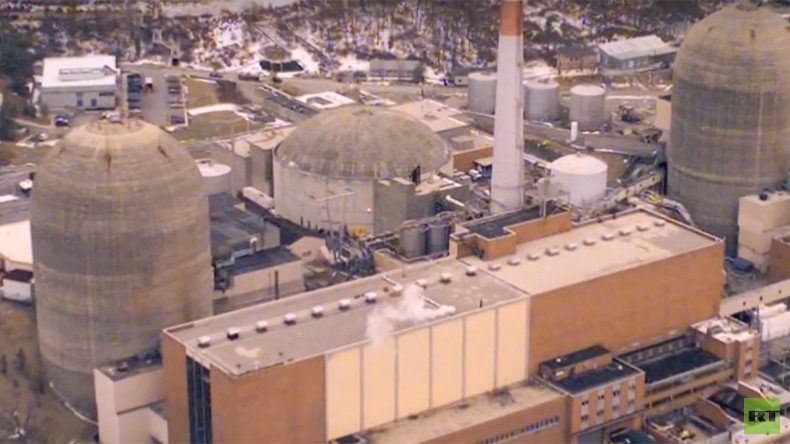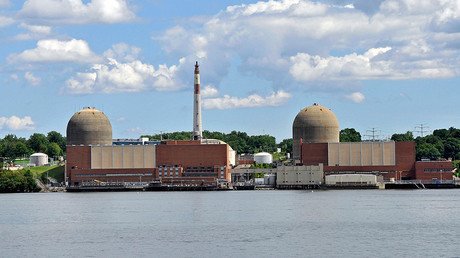Indian Point plant leak sparks concern over ‘Chernobyl on the Hudson’

News of the tritium water leak at the Indian Point nuclear power plant has rekindled concerns about the 40-year-old plant among the local residents, public health experts and environmentalists.
Situated on the Hudson River, 25 miles (40 km) north of New York City, Indian Point serves the electricity needs of around 2 million people. Its two working reactors have operated since 1974 and 1976, respectively.
Last month, crews preparing one of the reactors for refueling accidentally spilled some of the water containing the radioactive hydrogen isotope tritium, causing a massive radiation spike in groundwater monitoring wells. Entergy, the Louisiana-based company that owns the plant, chalked up the readings to “fluctuations that can be expected as the material migrates.”
The tritium leak is the ninth in a series of technical troubles at the facility in just the past year, four of which were serious enough to shut down the reactors, RT’s Alexey Yaroshevsky reported after visiting the plant.
According to Entergy, the tritiated water spill was contained within the plant, and never reached the Hudson or any other water source.
“There is no impact to public health or safety,” company spokeswoman Patricia Kakridas told RT.
Joanne DeVito feels differently. She and her daughters were all diagnosed with thyroid cancer in 2013, after living near Indian Point for two decades.
Indian Point tritium leak 80% worse than originally reported https://t.co/0D1cCfJ16npic.twitter.com/mgqh9r5xmR
— RT (@RT_com) February 10, 2016
According to Joseph Mangano, executive director of the Radiation and Public Health Project, the area around Indian Point is a “cancer cluster,” with the local rate of thyroid cancer 66 percent higher than the national average.
RPHP researchers compared the state and national cancer data from 1988-92 with three other five-year periods (1993-97, 1998-02, and 2003-07). The results, published in 2009, show the cancer rates going from 11 percent below the national average to 7 percent above in that timespan. Unexpected increases were detected in 19 out of 20 major types of cancer. Thyroid cancer registered the biggest increase, going from 13 percent below the national average to 51 percent above.
Entergy rejects any correlation between the plant’s operation and an increase in cancer rates. “There is no relation whatsoever,” Kakridas told RT.
“Everybody who lives near a nuclear plant is exposed to radiation. Some plants are worse than others,” Mangano told RT. In the case of Indian Point, it is a very old plant, and “there is a greater danger because of a large population living close by.”
At the time RPHP’s study was published, more than 20 million people lived within 50 miles of the plant.
The first reactor at Indian Point went into service in 1962, but was decommissioned in 1974 because the core cooling system no longer met regulatory requirements. The facility’s initial 40-year license expired in December last year, but the NRC has issued Entergy a temporary extension pending final approval.
While federal regulators seem set to extend the plant’s life by another 20 years, New York Governor Andrew Cuomo is just as determined to shut it down.
Critics of the plant have called it a “Chernobyl on the Hudson.” RT’s Alexey Yaroshevsky points out that this is not entirely fair. Indian Point is over 40 years old, and has had nine accidents over the last year alone. Chernobyl’s Reactor 4 was only three years old when it exploded in April 1986. Before then, the Chernobyl facility had only one previous accident.














